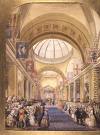
Sarkes C. Davids M.D. L.R.C.S. (1818 – 1844) was a Persian-born British physician, son of the then Court physician* to the Shah of Iran, who converted to homeopathy and practiced in England until his untimely death in 1844.
In 1841, Davids graduated with his M.D. from the University of Glasgow, and was awarded his Licence from the Edinburgh Royal College of Surgeons.
Davids spent some time in Stafford where he taught allopathic chemist and druggist James Marson the art of making triturations, globules, etc. Marson converted to homeopathy as a result, although he continued to also sell allopathic remedies..
In 1841, Sarkes C. Davids settled in Manchester where he established himself in private practice. There he began dispensing homeopathic medications from his Piccadilly residence for those unable to pay for his services. This was the basis for the public Manchester Homeopathic Dispensary that he helped found in January 1843.
It is very likely that the remedies Davids dispensed were produced by homeopathic chemist Henry Turner, who had opened his pharmacy in Manchester in 1842. Davids and Turner became close friends.
While studying in Glasgow, Davids had lodged in the same premises as a fellow student, the Irish-born homeopath Edward Phillips.
Sarkes Davids suffered from ill-health, and within a year of arriving in Manchester was forced to give up work and seek more conducive climes. His university friend Phillips, who had joined him in Manchester, took over both David’s practice and the homeopathic Dispensary.
Sarkes Davids died in London in the spring of 1844, aged just 25 years old. The following year, two articles by Davids, one on “A Case of Epilepsy,” and another on “A Method of Writing Down Cases,” were published in the British Journal of Homoeopathy.
An obituary for S. C. Davids was carried in George Atkin‘s The British and Foreign Homœopathic Medical Directory and Record, 1853:
[Davids] was born in Persia, in the year 1818. His parents had destined him to fill the united offices of priest and physician in the Armenian Church of his native country, but having, at an early age, embraced Christianity, and suffered great persecution form his relatives on account of his apostacy from the ancient faith, he resolved to quit his home and seek among strangers in England, that toleration his own countrymen denied him. Immediately on his arrival in Britain, Dr. Davids entered Glasgow College as a student of medicine; and, in 1840, became a graduate of the same University, as well as a member of the Royal College of Surgeons of Edinburgh. Dr. Davids was induced, by his friend Dr. Cronin, of London, to study Homoeopathy – which system he ultimately embraced, and became both a useful exponant, and successful practitioner of Hahnemann’s doctrines. Dr. Davids began practice in Manchester about the end of 1841, and had succeeded in establishing a good reputation, when his health gave way, and he was compelled to seek fresh vigour in a warmer and more genial clime. After a few months spent in Madeira, he again returned to Manchester, but it was not long ere the deadly power of Phthisis again enfeebled him; therefore he finally withdrew from active duty, and retired to Brixton, where he spent the last months of his life in the society of kind and devoted friends, and died in the spring of 1844.-Æt. 26.
Dr. Davids was the author of a modest little work, entitled “A Sketch of Homoeopathy,” which has gone through three editions, and of several articles in the medical journals. As a physician, Dr. Davids was minute and cautious in his examination and treatment of disease; his gentle deportment gained him many friends, and had his life been prolonged, he would, doubtless, have become one of the pillars of Homoeopathy and an ornament to his profession.
Select Publications:
- A Sketch of Homoeopathy, Or the System of Medical Treatment, with Specific Remedies in All Cases (1842)
Of Interest:
* If Sarkes Davids was indeed the son of a court physician to Fath-Ali Shah, then it is possible his father was the Dr. Daoud Khan who was mentioned in Reverend James Malcolm’s 1862 travel biography of missionary Anthony Norris Groves‘ 1832 visit to Baghdad.


Leave A Comment